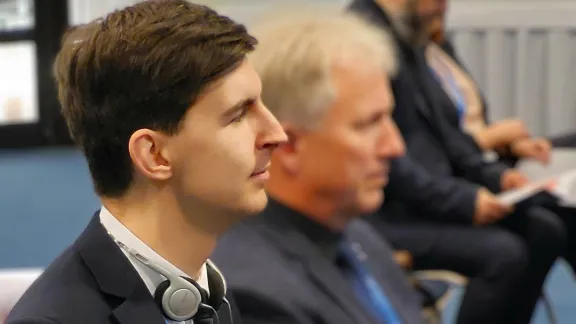Over three quarters of the Czech population has no church affiliation or religious belief, yet young people still look to the church as they search for a sense of meaning in their lives

Rev. Jan Brtníček at the recent Church Leaders Consultation for Central and Eastern Europe in Bratislava. Photo: ECAC SR/Jana Nunvárová
A youth leader in the Silesian Evangelical church reflects on the search for meaning in post-truth societies
(LWI) - As a young teenager in the Czech Republic, Jan Brtníček spent most of his time sitting alone in his room playing his favorite computer games. The youngest of three siblings, he had little interest in the church and was looking forward to a career in information technology.
But at 17, Jan’s life took an unexpected turn because of an older brother who had been struggling with a drug addiction. After a few visits to a local church, his brother prayed for healing and started on the road to recovery. “One night, he called out to God to save him and woke the next morning with a sense of hope and healing,” Jan recalls.
For two years, Jan’s brother shared stories about the ways in which God had answered his prayers when he felt at the lowest and most hopeless point. Slowly, Jan began to question the direction and purpose of his own life too. Despite initial resistance from his parents, he decided to abandon his IT course at university and study theology with the goal of ordination instead.
Secularism and social media
In the Czech Republic, one of the world’s most secular countries where over three quarters of the population declare no church affiliation or religious beliefs, Jan’s decision was not an easy option. Though his parents now fully support his new career choice, others question what future awaits as the government prepares to cut all financial support for the church in 2030.
“My church [the Silesian Evangelical Church of the Augsburg Confession] is trying to prepare well for this event,” Jan says. “We believe that if people understand the importance of supporting the life of the church, they will find the money to pay the salaries of their pastors too.” The COVID pandemic has led to a decline in the number of people attending church services, he reflects, “yet many young people are looking to the church to find a sense of meaning in their lives.”
Now ordained and serving as leader of the church’s youth department, Jan is passionate about making the gospel relevant and attractive to those even younger than himself. At 26, he is well aware of the ways that social media influences the lives and language of children and young adults, making peer-to-peer communication the most effective method of transmitting the gospel message.
In our post-fact society, the challenge is to find meaningful ways of speaking God’s word of truth which endures for centuries and millennia.
– Rev. Jan Brtníček, youth department leader for the Silesian Evangelical Church of the Augsburg Confession
“I don’t know a lot about TikTok or BeReal, so I need to rely on younger colleagues who understand that environment better,” he explains. In recent years, when we have had our church-wide youth gathering but didn’t have time to prepare in a good quality way, we asked our youngsters to get involved themselves and to take responsibility for organizing the whole event in ways that can be really relevant to their peers."
Young people are increasingly struggling with anxiety and depression, Jan notes, adding that they are easily confused by the fake news and misinformation that they find everywhere online. “In our post-fact society, the challenge for us is to find meaningful ways of speaking God’s word of truth which endures for centuries and millennia,” he says.
As a delegate at a recent Lutheran World Federation Church Leadership Consultation for Central and Eastern Europe, he was keenly sharing those challenges with other youth representatives from around the region. “If we want to find solutions, it is vital to sit and listen to others, giving space to young people to voice their own struggles and difficulties,” he says. “We cannot solve all the world’s problems, but if we find time and space for Jesus to speak to us, then we can understand what God wants us to do.”


